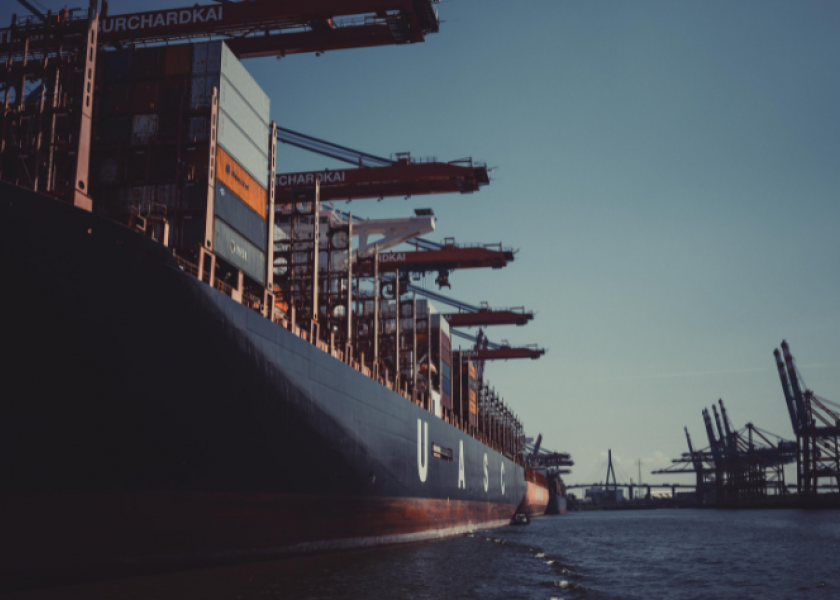Trucker Blockade Shuts Down Major California Seaport for Second Day

By Lisa Baertlein and Tom Polansek
Truckers protesting California's new "gig worker" law blockaded the state's third-busiest seaport for a second day on Thursday, stalling agricultural exports and threatening to worsen U.S. supply chain backups.
The operator of the largest marine terminal at the Port of Oakland closed it for business on Thursday, while the three other marine terminals on the property had some on-ship labor underway, port spokesman Robert Bernardo said.
Independent truck drivers have been picketing terminal gates and choking truck traffic on the port since Monday in protest of California's new labor law formally known as AB5.
Backers say AB5 aims to clamp down on labor abuses and push companies to hire drivers as employees - which would enable them to join unions and collectively bargain with employers.
The law was a win for unions but is broadly opposed by big rig drivers who say it would make it more expensive for them to remain independent and push them to become company employees.
Protesters and the trucking industry want California Governor Gavin Newsom to delay enforcement of the law. Some organizers say the protesters - whose rally call is "The cargo won't flow 'til AB5 goes" - won't stop until they get a sit-down with Newsom.
In a rebuff on Thursday, the governor's office said: "No one should be caught by surprise by the law's requirements. The industry should focus on supporting this transition."
The eighth-busiest U.S. container seaport - a key hub for agricultural trade - was already working to clear a pandemic-fueled cargo backup before the trucker protests began. The knock-on effects of the occasionally confrontational protests are already rippling beyond trucking.
"It's not just this as a one-off," Shawna Morris, senior vice president for U.S. Dairy Export Council and National Milk Producers Federation, said of the blockade.
ADDING TORNADO TO HURRICANE
Dairy farmers and other food producers have struggled to get products on the water because container shipping lines prioritized more lucrative, pandemic-fueled imports from Asia to the United States.
"We've added a tornado to the hurricane that the industry has been trying to endure for the last almost two years now," Morris said.
It also complicates matters for the International Longshore and Warehouse Union (ILWU), which is in-high stakes U.S. West Coast port labor contract negotiations with terminal operators. The ILWU supports AB5 and said its dock worker members didn't cross the blockade line for safety reasons.
"We're not going to put our members in harm's way to pass through the line of truckers," said Farless Dailey, ILWU Local 10 president.
"We have dispatched 450 workers in the past three days who haven't been able to get in to move cargo for the day, and they don't get paid when they don't get in," Dailey said.
When trucks and dock workers don't move cargo, the port clogs and ships don't move - exacerbating backups and amplifying risks for shippers who rely on the port.
Oakland handles about $1.86 billion in exports per month at this time of year. Two thirds of the value of those are agricultural products, and perishables will take the biggest hit from the shutdown, said Jock O'Connell, international trade advisor at consultancy Beacon Economics.
That puts at risk California's $20 billion-plus agriculture export industry and shipments of everything from almonds and rice to milk powder and wine.
The clock is also ticking for the $18 billion U.S. pork and beef export market, said Joe Schuele, spokesman for the U.S. Meat Export Federation.
Fresh U.S. beef and pork producers transport products hundreds of miles to the Oakland port because it is the preferred launch point for cargo ships bound for Asian countries like Japan and South Korea, Schuele said.
If port delays drag on more than a few days, the refrigerated meat may need to be frozen to prevent it from spoiling, which lowers its value while adding frozen storage costs, he said.
"You don't have a lot of time to spare," Schuele said.
(Reporting by Lisa Baertlein in Los Angeles, additional reporting by Tom Polansek in Chicago; Editing by Mark Porter and Diane Craft)
Read More:
What are the Greatest Threats Facing Pig Farmers? Leaders Speak Out
The ‘Beagle Brigade’ Receives Industry-Wide Support in Protection of U.S. Agriculture
Meat Alternatives Gain Traction at U.S. Military Bases to Reduce Cost and Storage Challenges







